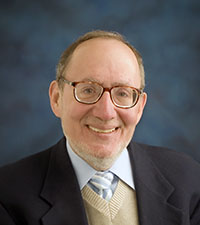
Professor and Chairman,
Department of Bioengineering
University of Pittsburgh
749 Benedum Hall
University of Pittsburgh,
Pittsburgh, PA 15261
Telephone: (412) 624-4725
Fax: (412) 383-8788
Education:
B.A. 1969 Physics, Brandeis University, Waltham, MA
1970 Physics, California State College, Long Beach, CA
M.S. 1973 Bioengineering, Carnegie-Mellon University, Pittsburgh, PA
Ph.D. 1976 Bioengineering, Carnegie-Mellon University, Pittsburgh, PA
Dr. Harvey S. Borovetz is the Deputy Director - Artificial Organs and Medical Devices at the McGowan Institute for Regenerative Medicine as well as the Chair of the Bioengineering department at the University of Pittsburgh.He joined the faculty of the University after receiving his B.A. degree in Physics from Brandeis University in 1969 and his M.S. and Ph.D. degrees, both in bioengineering, from Carnegie Mellon University in 1973 and 1976, respectively. Dr. Borovetz is also the Robert L. Hardesty Professor in the department of surgery, University of Pittsburgh School of Medicine, and senior lecturer of engineering in medicine at Carnegie Mellon University
Dr. Borovetz's current research interests are focused on the design and clinical utilization of cardiovascular organ replacements for both adult and pediatric patients. Since 1986, he has headed the university's Clinical Bioengineering Program in Mechanical Circulatory Support and has been featured in several publications. This is a one-of-a-kind program that supports patients who are implanted with a left ventricular assist device, or a total artificial heart, as a bridge to cardiac transplantation. This work in mechanical circulatory support followed Dr. Borovetz's early efforts in which he helped cardiac surgeons apply extracorporeal membrane oxygenation (ECMO) to successfully treat a large series of neonates in respiratory distress.
Other areas of research in which Dr. Borovetz and his research team are involved in include investigating the role of hemodynamics in vascular biology and physiology. For this work, Dr. Borovetz and his students developed a pulsatile perfusion apparatus for the purpose of exposing intact animal and human vessels to realistic physiologic and pathophysiologic hemodynamics (e.g., hypertension) ex-vivo. As such, this work complements the parallel plate flow and cell culture studies, which investigate the role of shear stress in endothelial cell biology. A seminal study in this area was the investigation of the putative biologic effects of exposing saphenous vein bypass grafts to arterial hemodynamics and biomechanical forces. The resulting paper, which evolved from nearly 10 years of effort in biomechanics and biochemical measurements of intact blood vessels, was awarded the prestigious Liebig Award for Vascular Surgery Research at the 1990 annual meeting of the International Society for Cardiovascular Surgery.
Dr. Borovetz is a fellow the American Institute of Medical and Biological Engineering, a past member of the Board of Trustees of the American Society for Artificial Internal Organs, and a past member of the Board of Directors of The Biomedical Engineering Society. He has served on numerous NIH study sections, as an ad hoc reviewer on the Scientific Advisory Committee of the Whitaker Foundation, and as an external reviewer for the Department of Biomedical Engineering, Rutgers University and the Bioengineering/Biotechnology initiative at the University of Massachusetts. Dr. Borovetz has also served as a panelist for the U.S. Department of Commerce, regarding its National Technology Initiative. In 1999 and 2000, Dr. Borovetz also spent one-half time at the NIH, where he served as a Health Sciences Administrator for the Bioengineering Research Group of the National Heart, Lung, and Blood Institute.
Resume

